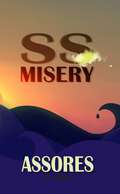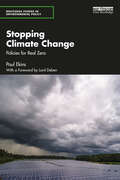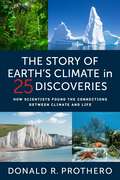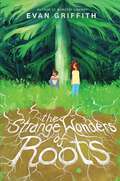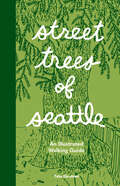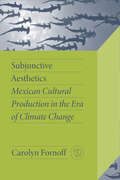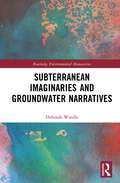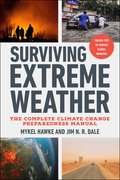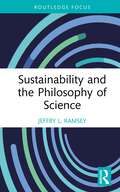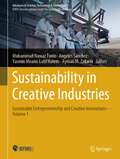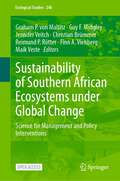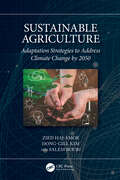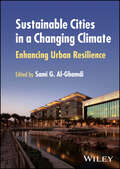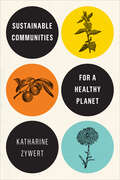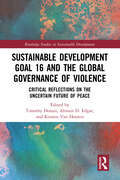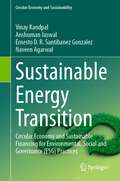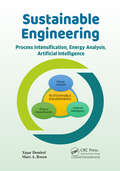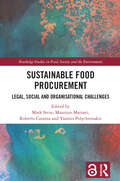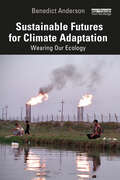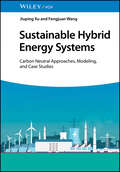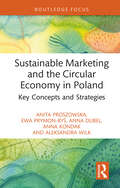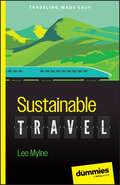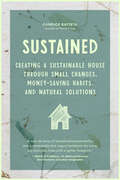- Table View
- List View
SS Misery
by AssoresUn libro sobre la supervivencia de la mente humana. Dos hombres perdidos en el mar tienen que enfrentar la lucha de estar solos y a la deriva. Al principio se llevan bien, pero apenas aparece un regalo misterioso, las cosas empiezan a ir cuesta abajo. Una novela que describe las condiciones en las que todos somos susceptibles. Un libro que muestra los límites de los humanos cuando enfrentamos la extinción personal. Cuando Severo y Maximiliano se encuentran perdidos en alta mar, ambos necesitan unir fuerzas para recuperar sus vidas. En medio de las dificultades, los dos necesitarán entenderse uno al otro para garantizar su supervivencia y, quién sabe, su cordura. SS Misery es una historia sobre perdición y humanidad.
Stopping Climate Change: Policies for Real Zero (Routledge Studies in Environmental Policy)
by Paul EkinsWritten by one of the leading experts in the field, Paul Ekins, Stopping Climate Change provides a comprehensive overview of what is required to achieve ‘real zero’ carbon dioxide emissions by 2050, and negative emissions thereafter, which is the only way to stop human- induced climate change. This will require innovation in socio-technical systems, and in human behaviour, on an unprecedented scale. Stopping Climate Change describes the changes required to meet this goal: in technologies, social institutions and individual activities. Paul Ekins examines in detail issues around the supply and demand of energy and materials, and the efficiency of their use. It also analyses greenhouse gas removal technologies, offsetting and geoengineering, and plots the reduction of the non- CO2 greenhouse gas-emitting activities. Having set out the changes required, Ekins considers the economic implications, in terms of both the innovation and investments that are necessary to bring them about, and the effects that these are likely to have on national economies. The evidence presented points clearly to the economic impacts of decarbonisation being positive for the majority of countries, and for the world as a whole, even before considering the benefits of avoided climate change. When the health benefits of stopping the burning of fossil fuels are factored in, the global net benefits of decarbonisation are unequivocal. Drawing on examples from the UK and Europe, but with wider relevance at a global scale, Stopping Climate Change clearly shows how determined policy action at different levels could stop climate change. It will be of great interest to students, scholars and policymakers researching and working in the field of climate change and energy policy.
Stopping Climate Change: Policies for Real Zero (Routledge Studies in Environmental Policy)
by Paul EkinsWritten by one of the leading experts in the field, Paul Ekins, Stopping Climate Change provides a comprehensive overview of what is required to achieve ‘real zero’ carbon dioxide emissions by 2050, and negative emissions thereafter, which is the only way to stop human- induced climate change.This will require innovation in socio-technical systems, and in human behaviour, on an unprecedented scale. Stopping Climate Change describes the changes required to meet this goal: in technologies, social institutions and individual activities. Paul Ekins examines in detail issues around the supply and demand of energy and materials, and the efficiency of their use. It also analyses greenhouse gas removal technologies, offsetting and geoengineering, and plots the reduction of the non- CO2 greenhouse gas-emitting activities. Having set out the changes required, Ekins considers the economic implications, in terms of both the innovation and investments that are necessary to bring them about, and the effects that these are likely to have on national economies. The evidence presented points clearly to the economic impacts of decarbonisation being positive for the majority of countries, and for the world as a whole, even before considering the benefits of avoided climate change. When the health benefits of stopping the burning of fossil fuels are factored in, the global net benefits of decarbonisation are unequivocal.Drawing on examples from the UK and Europe, but with wider relevance at a global scale, Stopping Climate Change clearly shows how determined policy action at different levels could stop climate change. It will be of great interest to students, scholars and policymakers researching and working in the field of climate change and energy policy.
The Story of Earth's Climate in 25 Discoveries: How Scientists Found the Connections Between Climate and Life
by Donald R. ProtheroOver 4.5 billion years, Earth’s climate has transformed tremendously. Before our more temperate recent past, the planet swung from one extreme to another—from a greenhouse world of sweltering temperatures and high sea levels to a “snowball earth” in which glaciers reached the equator. During this history, we now know, living things and the climate have always influenced and even shaped each other. But the climate has never changed as rapidly or as drastically as it has since the Industrial Revolution.In this lively and entertaining book, Donald R. Prothero explores the astonishing connections between climate and life through the ages, telling the remarkable stories of the scientists who made crucial discoveries. Journeying through the intertwined evolution of climate and life, he tackles questions such as: Why do we have phytoplankton to thank for the air we breathe? What kind of climate was necessary for the rise of the dinosaurs—or the mammals, their successors? When and how have climatic changes caused mass extinctions? Prothero concludes with the Ice Ages and the Holocene, the role of climate in human history, and the perils of anthropogenic climate change. Understanding why the climate has changed in the past, this timely book shows, is essential to grasping the gravity of how radically human activity is altering the climate today.
The Strange Wonders of Roots
by Evan GriffithFrom the acclaimed author of Manatee Summer comes a poignant story about a girl who learns to lay down roots as she’s drawn into a fight over a local grove of trees that’s in danger of being torn down. Perfect for fans of Hoot and Operation Redwood.Holly Foster knows that nothing lasts—not hometowns or schools, or even family. It’s just safer to keep herself uninvolved. So when she’s sent to spend part of the summer with her uncle, she knows better than to get attached to him…or any part of his small Vermont town of Arden.But when she arrives, she’s drawn into the drama that’s split the town: The local plastic factory is trying to tear down the trees in the center of Arden to build a visitor’s center and museum. Holly shocks herself by stepping into the fray and taking on one of the most powerful families in the area. But as she learns more about the town—and makes a new friend or two—Holly is determined to protect the one place she thinks she could finally belong. But will she be able to convince the other townspeople that the trees deserve to stay?
Street Trees of Seattle: An Illustrated Walking Guide
by Taha EbrahimiThe majestic trees of Seattle's neighborhoods take center stage in this illustrated and informative walking guide. Want to discover which neighborhood has the highest concentration of cherry street trees when cherry blossoms are at their peak?Eager to stroll down the only street lined with western red cedars?Curious how monkey puzzle trees made their way to the city?Using data visualization as a starting point, the author takes readers on a tour of existing street trees throughout Seattle's neighborhoods and iconic parks through charming illustrations and maps. In the process, she educates readers on the history of the trees and the city, and offers up sketches of trees, leaves, and leaflets to identify trees throughout 33 different neighborhoods. The most notable of each species are highlighted, so urban adventurers can fully appreciate their surroundings or design their own walking routes to experience these natural wonders in their favorite areas of the city.The book is organized alphabetically by neighborhood and each area: Showcases a species of treeIncludes a history of the tree and neighborhoodOffers maps and callouts for spotting the best street specimens In an increasingly digital world, the book invites readers to slow down and embrace an analog approach to tree-spotting during their urban meanderings.
Subjunctive Aesthetics: Mexican Cultural Production in the Era of Climate Change (Critical Mexican Studies)
by Carolyn FornoffDuring the twenty-first century, Mexico has escalated extractive concessions at the same time that it has positioned itself as an international leader in the fight against climate change. Cultural production emergent from this contradiction frames this impasse as a crisis of imagination. Subjunctive Aesthetics studies how contemporary writers, filmmakers, and visual artists grapple with the threat that climate change and extractivist policies pose to Mexico's present and future. It explores how artists rise to the challenge of envisioning alternative forms of territoriality (ways of being in relation to the environment) through strategies ranging from rewriting to counterfactual speculation. Whereas ecocritical studies have often focused on art's evidentiary role—its ability to visualize and prove the urgency of environmental damage—author Carolyn Fornoff argues that what unites the artists under consideration is their use of more hypothetical, uncertain representational modes, or "subjunctive aesthetics." In English, the subjunctive is a grammatical mode that articulates the imagined, desired, and possible. In the Spanish language, it is even more widely used to express doubts, denials, value judgments, and emotions. Each chapter of Subjunctive Aesthetics takes up one of these modalities to examine how Mexican artists, writers, and filmmakers activate approaches to the planet not just as it is, but as it could be or should be.
Subterranean Imaginaries and Groundwater Narratives (Routledge Environmental Humanities)
by Deborah WardleThis book interrogates the problems of how and why largely unseen matter, in this case groundwater, has found limited expression in climate fiction. It explores key considerations for writing groundwater narratives in the Anthropocene. The book investigates a unique selection of climate fiction alongside an exploration of hydrosocial environmental humanities through a focus on groundwater and groundwater narratives. Providing eco-critical analysis, with creative fiction and non-fiction excerpts interwoven throughout, and drawing on Indigenous Australian and Australian settler novels and poems alongside European, American and Japanese texts, the book illuminates the processes of ‘storying with’ subterranean waters – their facts, uncertainties, potencies and vulnerabilities. In a time when the water crisis in an Australian and worldwide context is escalating in response to global warming, giving voice to the complexities of groundwater extraction and pollution is vital. Drawing from non-representational, posthumanist and feminist perspectives, the book provides an important contribution to transnational, comparative climate fiction analysis, enabling an interdisciplinary exchange between hydrogeological science and the eco-humanities. This book is an engaging read for scholars and students in creative writing, environmental humanities, cultural and post-colonial studies, Australian studies, and eco-critical literary studies. Writers and thinkers addressing the problems of the Anthropocene are called to pay attention to the importance of subterranean imaginaries and groundwater narratives.
Summer's Magic (An Indigenous Celebration of Nature)
by Kaitlin B. CurticeAn Indigenous boy invites new friends to share in beloved traditions as he celebrates the joy of summer and his love for Earth and Creator in this picture book that revels in the warmth, light, and fun of the longest days of the year.Bo, a proud Potawatomi boy, is excited to enjoy long summer days tending his garden, walking his dog, and playing in the river with his big sister, Dani. When he discovers that his family's favorite spot has been polluted with garbage, Bo realizes that caring for Earth is part of what makes summer special. And when he overcomes his shyness and invites others to join in, he discovers that summer's magic has even more surprises in store.&“Bo is short for saying Bodewadmi ndaw, which is &‘I am Potawatomi&’ in our language. Bo is a celebration of Anishinaabe culture, from the way he wears his hair in a traditional braid to the way he shares the magic of summer and honors Earth by caring for her as she cares for us.&”—Kaitlin B. Curtice
Surviving Extreme Weather: The Complete Climate Change Preparedness Manual
by Mykel Hawke Jim N.R. DaleThe only guide you need to prepare for the dangerous effects of climate change. The world has changed, and impacts of global warming means weather events like extreme heat, wildfires, hurricanes, and droughts are now being felt by all of us. We can ignore climate change no longer and must prepare ourselves to survive in new conditions. The key to surviving extreme weather events is to understand them from a practical perspective and then plan and execute tactical responses. In Surviving Extreme Weather, Mykel Hawke, a renowned survivalist and bestselling author of Hawke&’s Special Forces Survival Handbook and Hawke&’s Green Beret Survival Manual, and British meteorologist Jim N. R. Dale, share their expert knowledge and personal experiences while offering valuable insights into the science behind our new weather and how to apply situational awareness, preparedness, and psychology to survive.Surviving Extreme Weather: The Complete Climate Change Preparedness Manual is categorized by elements—fire, water, wind, and earth—events are explained with recommendations anyone can follow to protect themselves and their family, and to minimize the risks of damage to life and property. Included are lists of items every person, home, business, and vehicle should always stock, such as: first aid kits, afflictions, and applications; emerging technologies to help protect against different weather phenomena; structural and landscape precautions and improvements; philosophies to help family, friends, and neighbors get through any environmental ordeal.
Sustainability and the Philosophy of Science (Routledge Focus on Environment and Sustainability)
by Jeffry L. RamseyThis book demonstrates how the philosophy of science can enhance our understanding of sustainability and the practices we use to enact it. Examining assumptions about concepts, theories, evidence, and the moral ideals of sustainability can better orient us as we pursue this urgent and important goal. The book applies perspectives and tools from the philosophy of science – construed broadly to include portions of science and technology studies, history of science, and philosophy more generally – to sustainability discourse. It argues that widely held assumptions regarding the meaning of concepts, methods of theorizing and inferential practice, evidential structure, and ethics limit our understanding and practice of sustainability. It offers philosophical alternatives that capture more fully the confusing, wicked nature of sustainability challenges. The alternatives draw attention to existing but often undervalued frameworks in sustainability discourse. This book is aimed towards academics, researchers, and post-graduates working in sustainability, as well as philosophers of science and environmental philosophers interested in the philosophical issues raised by the pursuit of sustainability.
Sustainability in Creative Industries: Sustainable Entrepreneurship and Creative Innovations—Volume 1 (Advances in Science, Technology & Innovation)
by Muhammad Nawaz Tunio Angeles Sánchez Yasmin Moanis Latif Hatem Ayman M. ZakariaThis book discusses a compelling array of topics at the intersection of entrepreneurship, education, and technological innovation within the creative industries. It delves into a captivating exploration of sustainable entrepreneurship in Part 1, where key characteristics of sustainable entrepreneurs and factors influencing entrepreneurial intention are dissected. By unearthing the nexus between entrepreneurial alertness, networking capability, and venture performance, it provides intriguing insights into sustaining traditional crafts and brands amid the COVID-19 pandemic. The following parts not only unveil current innovative pedagogical strategies in creative design education but propels you into the future, exploring the harmonious fusion of academia and industry in sustainability-driven programs. Designed for educators, students, researchers, and practitioners in entrepreneurship, design, and technology fields, this book offers a transformative journey into sustainable practices, innovative pedagogies, and cutting-edge advancements. Engaging, informative, and thought-provoking, it is a must-read for those seeking to shape the future of creative industries through entrepreneurship, education, and innovation.
Sustainability of Southern African Ecosystems under Global Change: Science for Management and Policy Interventions (Ecological Studies #248)
by Graham P. von Maltitz Guy F. Midgley Jennifer Veitch Christian Brümmer Reimund P. Rötter Finn A. Viehberg Maik VesteThis open access book about the sustainability of marine and terrestrial ecosystems in southern Africa provides a synthesis of the research program Science Partnerships for the Adaptation to Complex Earth System Processes (SPACES II, 2018-2022). It addresses the scientific, social, and economic issues related to climate change, its potential impacts on the various ecosystems, adaptations, and management interventions for enhancing systems resilience in Southern Africa. It is written by numerous scientists from African states and Germany and summarizes the latest research findings, which are of great relevance for a better understanding of climate change impacts, adaptations, and vulnerabilities as well as for developing management options and policy options to reduce the associated risks. This is crucial considering that the projected African population increase is exceptional. Furthermore, climate change is assumed to hit southern Africa extremely hard with a significant increase in extreme events and the frequency of severe droughts, heat waves, and flooding. Southern Africa hosts a high variety of ecosystems, which belongs to important biodiversity hotspots for unique flora and fauna. The surrounding oceans form, in turn, a bottle neck within the ocean’s global thermohaline circulation, act as a still poorly understood carbon sink and source and play an important role for fisheries as they are highly productive. Considering these important aspects, the book is an important interdisciplinary contribution to the scientific literature and will find a wide readership.The book is aimed at students, teachers, and scientists in the fields of terrestrial and marine ecology, environmental, nature and landscape planning, agriculture, environmental and resource management, biodiversity, and nature conservation, as well as scientists and representatives in specialised authorities and associations, nature conservationists, and policy makers of related disciplines.
Sustainable Agriculture: Adaptation Strategies to Address Climate Change by 2050
by Zied Haj-Amor Dong-Gill Kim Salem BouriEver-increasing population growth, combined with ongoing climate change signals that agriculture will face great challenges in ensuring global food security by 2050. Additionally, climate change-driven variations in mean sea level, wave conditions, storm surge, droughts, and river flows could have serious effects on agriculture and other sectors. Considering these factors and the extremely high value and necessity of agriculture worldwide, effective adaptation measures underpinned by reliable climate change impact assessments are essential to conserve soil and water resources and ensure food security. Sustainable Agriculture: Adaptation Strategies to Address Climate Change by 2050 provides a thorough examination of these issues, and presents in-depth analysis, practical case studies, and numerous examples of adaptation options throughout for various regions of the world.Features: Presents up-to-date, scientifically robust information on climate change projections in Europe, Asia, America, Africa, and Australia Provides pathways to sustainable agricultural options rather than just defining the climate change issue Includes case studies and practical examples throughout the world Presents a framework by which policymakers can begin implementing strategies for improving agricultural productivity
Sustainable Cities in a Changing Climate: Enhancing Urban Resilience
by Sami G. Al-GhamdiSustainable Cities in a Changing Climate Build and manage the sustainable cities of the future with this comprehensive guide Climate change is among the biggest challenges facing today’s cities, which are in turn a major factor in driving or mitigating climate change. It is no surprise then that urban planning authorities are under mounting pressure to create cityscapes suited to the 21st century. Sustainable Cities in a Changing Climate offers a systematic overview of the environmental and sustainability challenges facing urban planners and policymakers, and how to meet those challenges. Beginning with an analysis of how climate change impacts built environments, it proceeds to offer quantitative analysis and practical solutions for strengthening urban resilience. Sustainable Cities in a Changing Climate readers will also find: A future-oriented approach that accounts for both known and unknown threats Detailed discussion of threats including environmental changes, global pandemics, natural disasters, and more Case studies from around the globe, including biofuel generation in China and the 2022 World Cup in Qatar Sustainable Cities in a Changing Climate is indispensable for environmental engineers, urban planners and policymakers, and advanced students in environmental planning and architecture.
Sustainable Communities for a Healthy Planet
by Katharine ZywertSustainable Communities for a Healthy Planet presents an unconventional collection of ideas, practices, and ways of living together with the potential to enable long-term human and planetary health. Grounded in first-hand accounts from researchers, health practitioners, and social innovators across diverse fields, Katharine Zywert’s book argues that the most promising approaches often depart substantially from the incentive structures, goals, and mindsets that define the status quo and do not necessarily align with mainstream sustainability discourses. The book instead presents promising approaches that disrupt dominant ideas about mental health, ageing, and chronic illness; circumvent exploitative markets for medications, medical technologies, and professionalized care; attend not only to the health of individual human bodies, but to the health of internal ecologies, human populations, nonhuman species, and the planet as a whole; and embody alternative, more inclusive ways of practicing medicine within communities and ecosystems. The stories assembled in this book illustrate how human beings might live healthy lives, supported by health systems that are not dependent on perpetual economic growth. Sustainable Communities for a Healthy Planet challenges conventional ways of thinking about the future of health systems and asks hard questions about what it takes to cultivate human and planetary health in a time of rapid ecological, economic, and social change.
Sustainable Development Goal 16 and the Global Governance of Violence: Critical Reflections on the Uncertain Future of Peace (Routledge Studies in Sustainable Development)
by Timothy Donais Alistair D. Edgar Kirsten Van HoutenThis book brings together a diverse range of scholars and practitioners working at the nexus of peace and development to reflect, at the mid-way point of the Sustainable Development Goals implementation period, what impact Goal 16 has made, or may yet make, toward reducing violence in ‘all its forms.’ Adopted in 2015, the Sustainable Development Goals include 17 objectives designed to shape and direct the global development agenda through to 2030, with Goal 16 aiming to promote ‘peaceful and inclusive societies for sustainable development.’ Amidst an ongoing global pandemic, evidence of a fracturing liberal international order, and the persistence of seemingly intractable conflict in large parts of the world, this volume takes stock of current progress toward providing access to justice and ensuring inclusive and democratic institutions. Across 15 chapters, the book’s contributors explore the universal aspirations of Goal 16 and its specific implications for conflict-affected states, which continue to experience ‘development in reverse,’ and for historically marginalized groups such as women, youth, the disabled, and indigenous peoples. In doing so, it offers a comprehensive assessment of Goal 16’s broader contribution to the creation of a more just, peaceful world against the realities of societies emerging from the COVID-19 pandemic and grappling with a deepening climate crisis. This volume will appeal to scholars, researchers, policymakers, and postgraduate students in sustainable development, global governance, international relations, global development, international law, and political science.
Sustainable Energy Transition: Circular Economy and Sustainable Financing for Environmental, Social and Governance (ESG) Practices (Circular Economy and Sustainability)
by Vinay Kandpal Anshuman Jaswal Ernesto D.R. Santibanez Gonzalez Naveen AgarwalThe book offers a comprehensive overview of the challenges and opportunities associated with the transition to sustainable energy, circular economy, and sustainable financing for ESG practices. The publication is needed at this time because the world is facing urgent environmental and social challenges, such as climate change, resource depletion, and social inequality, which require a fundamental transformation of our economic and social systems. The transition to sustainable energy, circular economy, and sustainable financing for ESG practices offers a promising pathway to address these challenges and achieve sustainable development goals.The purpose of the publication is to provide a holistic and practical guide for policymakers, business leaders, investors, and other stakeholders who are interested in advancing sustainable energy, circular economy, and ESG practices. The book covers a range of topics, including the drivers of the transition, policy frameworks and regulations, technology and innovation, business models and financial instruments, and the role of stakeholders in facilitating the transition. It also emphasizes the importance of integrated approaches that balance economic, social, and environmental objectives, and provides practical examples and case studies of successful sustainable energy, circular economy, and ESG practices from around the world.The new contribution of this publication is its interdisciplinary and practical approach to sustainable energy, circular economy, and ESG practices. The book draws on the latest research from various fields, including economics, engineering, environmental science, and social science, and provides a synthesis of best practices and lessons learned from a diverse range of stakeholders, such as governments, businesses, and civil society organizations. The publication also provides a roadmap for how stakeholders can work together overcome the challenges of the transition and create a more sustainable and equitable future.The book is a timely and essential guide for anyone who is interested in advancing sustainable development goals. The book provides a comprehensive overview of the challenges and opportunities associated with the transition to sustainable energy, circular economy, and sustainable financing for ESG practices and offers practical solutions and case studies from around the world. Its interdisciplinary and practical approach makes it a valuable resource for policymakers, business leaders, investors, and other stakeholders who are committed to creating a more sustainable and equitable future.
Sustainable Engineering: Process Intensification, Energy Analysis, and Artificial Intelligence
by Yasar Demirel Marc A. RosenSustainable engineering is of great importance for resilient and agile technology and society. This book balances economics, environment, and societal elements of sustainable engineering by integrating process intensification, energy analysis, and artificial intelligence to reduce production costs, improve the use of material and energy, product quality, safety, societal well-being, and water usage. The book provides comprehensive discussion of topics on process intensification, energy analysis, and artificial intelligence that include optimization, energy integration, green engineering, pinch analysis, exergy analysis, feasibility analysis, life cycle assessment, circular economy, bioeconomy, data processing, machine learning, expert systems, digital twins, and self-optimized plants for sustainable engineering.
Sustainable Food Procurement: Legal, Social and Organisational Challenges (Routledge Studies in Food, Society and the Environment)
by Mark Stein Maurizio Mariani Roberto Caranta Yiannis PolychronakisThe book examines sustainable food procurement policy and practice in the European Union and beyond, exploring the extent to which sustainability objectives have been achieved and evaluating the new developments taking place at both EU and national levels.While there is a growing recognition that public authorities can use public procurement as a policy tool to pursue multiple environmental, health and socio-economic objectives, contracting authorities still face many challenges. This volume investigates the scope for pursuing sustainable objectives in public procurement of food and catering services, examining different regulatory contexts and organisational models to answer the overall question of how to integrate sustainability concerns into the various phases of public food procurement processes. Contributions in the book examine the policy and legal procurement framework and practices for sustainable public catering in three EU Member States: Italy, France and Spain. There is a comparative survey of the Baltic Region, including Denmark, Estonia, Finland, Poland and Russia, and moving beyond the EU, there is examination of the UK and Brazil, as well as a cross country comparison of the UK with Denmark and Sweden. Drawing on the expertise of an interdisciplinary and intersectoral team of contributors allows the book to benefit from the insights of different disciplines, including business sciences, anthropology and law. Tapping into the global discussion on public food procurement as a means to achieve multiple social and environmental goals, this work will stimulate readers looking for new creative ways to create value through public food purchasing.This book will be of great interest to students, researchers, policymakers and public- and private-sector representatives interested in public procurement, food policy and law, sustainable food sourcing and supply chain management.
Sustainable Futures for Climate Adaptation: Wearing Our Ecology
by Benedict AndersonConsidering sustainability as a flawed and restrictive term in practice, Sustainable Futures for Climate Adaptation argues that we must radically adapt humanity and reform society, cities, buildings, and our approach to migration in order to coexist in harmony with our natural environments. The book conceives an Earth–human coexistence where the world’s regions are shared globally between all people, in contrast to a reality where we have lost touch with the natural world. It is this decoupling of humanity and nature that has brought us to the brink of climate disaster. In response, Benedict Anderson explores the concept of ‘wearing our ecology’, where human mobility is synchronized with the environment, merging people with landscapes, topographies, and geographies. Anderson argues that we need to create new migration routes for people moving between the Global South and North and establish flexible and adaptive living environments. Only by rethinking separations between urban and rural, resource extraction and consumption, racial prejudice and accessibility are we able to forge a closer partnership with nature to adapt to climate change and mitigate the worst of its effects. Touching on themes of adaptive urban design, racial and gender segregation and inequality, and climate apocalypticism, this book will be valuable reading for researchers, scholars, and upper-level students in the fields of urban studies, migration studies, human geography, ecology, politics, and design.
Sustainable Hybrid Energy Systems: Carbon Neutral Approaches, Modeling, and Case Studies
by Jiuping Xu Fengjuan WangSustainable Hybrid Energy Systems Discovering comprehensive approaches to build sustainable hybrid energy systems Hybridization is the eternal theme of human energy utilization. However, it has never been more important than it is now because of the urgency of promoting energy transition and achieving carbon neutrality. Therefore, exploring the design, combustion, operation, and policy challenges of sustainable hybrid energy systems becomes increasingly important. Sustainable Hybrid Energy Systems: Carbon Neutral Approaches, Modeling, and Case Studies provides a detailed explanation of these aspects. Dividing hybrid energy systems into three categories—co-located, co-combusted, and co-operated, this book emphasizes the deployment optimization, emission quota allocation, scheduling coordination, and renewable portfolio standards implementation of these systems. The results are essential tools for understanding the current and future of multi-input single-output hybrid energy systems. Sustainable Hybrid Energy Systems readers will also find: Clear logical framework that reveals the constitutes of hybrid energy systems.Systematic technical scheme for building an economic, environmental, flexible, and resilient future energy system.Extensive case studies from single power plant level, multiple power plant level, and grid level.Effective guidelines for wider application of the proposed carbon neutral approaches. Sustainable Hybrid Energy Systems is ideal for power engineers, electrical engineers, scientists in industry, and environmental researchers looking to understand these energy solutions. It will also provide collectible value for libraries.
Sustainable Marketing and the Circular Economy in Poland: Key Concepts and Strategies (Routledge Focus on Environment and Sustainability)
by Anita Proszowska Ewa Prymon-Ryś Anna Dubel Anna Kondak Aleksandra WilkSustainable Marketing and the Circular Economy in Poland outlines the specific challenges around formulating an organisation's marketing strategy in line with the circular economy (CE) framework.This book helps to solve the problem of ineffective pro-environmental programmes and marketing tools, which are currently used by enterprises to make their activities more sustainable. The authors identify key concepts and strategies of sustainable marketing to highlight the trends and development directions of marketing activities of modern enterprises. Focussing on Poland as a central case study, the book is illustrated with examples of organisations that are implementing sustainable marketing activities that are compatible with the CE model. It also presents the results of studies which examined the pro-environmental marketing efforts of small- and medium-sized enterprises, non-governmental organisations and other actors in Poland. To conclude, the authors put forward recommendations for CE network stakeholders regarding sustainable marketing management, focussing specifically on how to avoid accusations of greenwashing and other unethical organisational behaviour.This book will be of great interest to students and scholars of green marketing, sustainable business and the CE, as well as entrepreneurs and business professionals looking to formulate sustainable marketing strategies.
Sustainable Travel For Dummies
by Lee MylneHow to travel lightly across planet Earth Sustainable Travel For Dummies is for travelers of all ages and budgets who want to reduce their carbon footprints, respect and protect the planet, contribute to local economies, and incorporate conservation into their travel experiences. That’s you! This easy-to-read guide shows you what sustainable travel is, why it’s important, and how to do it—with no travel shaming. Award-winning travel journalist Lee Mylne brings a global perspective on fun ways to travel responsibly. A must-have resource for globetrotters and for those whose travels keep them close to home, this book covers alternative transportation, unique accommodations, fulfilling cultural experiences, everything else the eco-savvy traveler needs to know. Discover how to plan eco-friendly trips to destinations near and far Reduce your carbon footprint while still enjoying life-affirming experiences Learn about alternative methods of transportation and sustainable accommodations Gain cultural awareness and get fun ideas for making the most of your travel Sustainable Travel For Dummies is an inspiring read for travelers who are new to sustainable and ethical travel and seeking practical tips for eco-conscious wandering.
Sustained: Creating a Sustainable House Through Small Changes, Money-Saving Habits, and Natural Solutions
by Candice BatistaHelp Save Our Planet with Money-Saving Sustainable Tips for Your HouseHouseholds are among the biggest contributors to global greenhouse gas emissions worldwide. Could the secrets of saving the environment (and money) be closer to home than we thought?Looking for easy, budget-friendly ways to reduce your environmental impact and save money? Authored by award-winning environmental journalist, Candice Batista, Sustained takes you on an eye-opening journey towards sustainability and eco-friendly living─starting at home. This step-by-step, eco-living guide offers simple yet powerful ways to turn each room in your home into a hub of sustainability, while pocketing impressive savings every step of the way.Small changes, big impact. Starting with a deep dive into how our actions at home impact the planet, Sustained offers a practical suite of never-before-seen tools and solutions to initiate the shift towards a greener lifestyle–without draining your time, energy, or budget.Inside find:Eye-Opening Ideas: Explore green cleaning alternatives, ethical fashion brand recommendations, kitchen composting and waste management advice, laundry routine overhaul guidance, and more.Cleaner and Greener: Reduce your dependence on chemical products and single-use plastics, decipher cryptic food and fashion labels, shop like an eco-pro, and make room for a new lifestyle that’s kinder to you, your pocket, and the planet.Eco-Living Simplified: Going green doesn’t have to push your bank account into the red. Uncover tried-and-trusted tips for sustainable living, fresh recipe ideas, and up-to-date insights into top-rated biodegradable home products.Environmentally conscious readers of sustainability books like Simply Living Well, The Backyard Homestead Bible, or Sustainable Minimalism, will love Candice Batista's Sustained.
